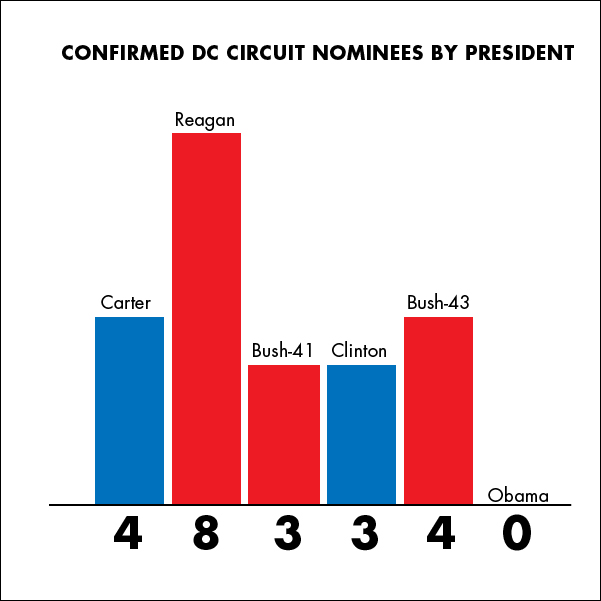The Wall Street Journal published a remarkable editorial yesterday accusing President Obama of acting like a “king” and acting illegitimately “for political ends” because he wants to fulfill his constitutional responsibility to nominate people for each of the judgeships that Congress has created on the D.C. Circuit Court of Appeals, the second most influential court in the country.
Notably, the Journal editorial does not oppose any nominees on the merits. That’s because President Obama has not yet nominated anyone to fill the vacant ninth, tenth, and eleventh seats on this 11-member court. What the Journal objects to is the very idea that President Obama wants to fill seats at all.
Their reasoning is that “the court doesn’t need the judges.” They cite the D.C. Circuit’s workload, which is currently higher per authorized judgeship than it was when George W. Bush nominated Thomas Griffith and Janice Rogers Brown to the 10th and 11th seats (120 today vs. 109 then).
It’s good to be the king. When the federal courts overturn your Administration’s rules or find decisions unconstitutional, you can pack them with judges more likely to rule your way. That seems to be the working theory at the White House, where word is that President Obama is close to nominating several new judges to sit on the D.C. Circuit Court of Appeals.
…
The point is that the D.C. Circuit doesn’t need new judges to handle the workload. Congress recognized this in 2008 when it reduced the court’s authorized judgeships to 11 from 12. But even that is too many because the last time the court had a full slate of 11 active judges was 1999. In April, Iowa Republican Chuck Grassley introduced a bill that would move two of the D.C. Circuit’s judgeships to the busier Second and Eleventh Circuits and eliminate a third.
That makes sense unless your goal is packing the court for political ends. Senior judges don’t sit en banc (i.e., full court review) unless they sat on the three-judge panel that first hears a case. So the White House may figure it has a better chance of using en banc review to overrule a decision it doesn’t like. Packing the court also means the White House is more likely to draw a three-judge panel favorable to its legal and policy preferences.
Mr. Obama ought to settle for adding Mr. Srinivasan to the court. If he insists on trying to pack it, Republicans should just say no.
In fact, the D.C. Circuit’s workload per active judge is higher now than it was when conservatives successfully confirmed Bush nominee Griffith to the eleventh seat in 2005, which resulted in there being approximately 121 pending cases per active judge. That number has now increased to about 188 cases per active judge, according to the most recent data on pending cases made available by the Administrative Office of U.S. Courts.
But the numbers are only part of the story. Due in part to statutes requiring certain types of cases to be heard by the D.C. Circuit and no other, it has a much higher proportion of extremely complex cases than do other circuits.
As former D.C. Circuit Chief Judge Pat Wald — who served on that court for more than twenty years — has explained:
The D.C. Circuit hears the most complex, time-consuming, labyrinthine disputes over regulations with the greatest impact on ordinary Americans’ lives: clean air and water regulations, nuclear plant safety, health-care reform issues, insider trading and more. These cases can require thousands of hours of preparation by the judges, often consuming days of argument, involving hundreds of parties and interveners, and necessitating dozens of briefs and thousands of pages of record – all of which culminates in lengthy, technically intricate legal opinions.
Even Chief Justice John Roberts, who served on the D.C. Circuit, agrees that the D.C. Circuit’s caseload is unique. As he wrote in “What Makes the D.C. Circuit Different? A Historical View:”
It is when you look at the docket that you really see the differences between the D.C. Circuit and the other courts. One-third of the D.C. Circuit appeals are from agency decisions. That figure is less than twenty percent nationwide. About one-quarter of the D.C. Circuit’s cases are other civil cases involving the federal government; nationwide that figure is only five percent. All told, about two-thirds of the cases before the D.C. Circuit involve the federal government in some civil capacity, while that figure is less than twenty-five percent nationwide.[2]
In fact, there is a scheme to transform the D.C. Circuit for purely “political ends.” That scheme is being orchestrated by Republican Sen. Chuck Grassley, who wants to dramatically cut the number of judgeships on the court in order to prevent President Obama naming new judges to it.
It’s no wonder Grassley and the WSJ want to keep the D.C. Circuit as it is: It is dominated by judges who were nominated by Republican presidents dedicated to imposing far right-wing ideology from the federal bench. The results have been devastating, as analyzed in a recent PFAW report: America’s Progress At Risk: Restoring Balance to the D.C. Circuit Court of Appeals. And since we released our report, the ideologues on this court have continued to bend the law and ignore logic in order to find against the interests of ordinary people and in favor of powerful corporate interests.
Filling statutorily created judgeships on the D.C. Circuit is part of the president’s constitutional duty. The idea that the president acts like a king when he does so would have sounded strange to President Obama’s predecessors, who faced no such challenges to their right to nominate people to the courts:

